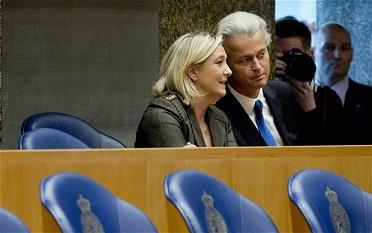Anti-Islam Far-Right Rises Ahead of European Poll

“The latest polls indicate that far-right political parties will do better than at any time since the war (WWII),” Tony Burman, former head of CBC News and Al-Jazeera English, wrote in an article published by The Star on Saturday, May 17.
“That outcome is certain to cause anxiety in Europe and beyond,” Burman, who teaches journalism at Ryerson University, added.
Citizens from the 28-member countries of the European Union will vote, from May 22 to 25, to pick a new European Parliament of 751 members for the next five years.
According to opinion polls, the election is expected to draw a low number of voters because of public disillusion with the EU combined with the economic crisis.
The widespread boycott is expected to give rise to the growing number of rightist and populist political parties in Europe.
In France, the anti-Islam National Front party is striving to be France's big winner in European Parliament elections next weekend.
Holding just two seats currently, the party hopes to win up to 20 of France's 74 European Parliament seats in the Sunday, May 25, vote.
Dutch far-right leader Geert Wilders was also planning to secure a good rise in the upcoming polls, coming third in opinion polls.
The latest Ipsos opinion poll on 1 May ranked Wilders’ PVV third in the Netherlands, just below the ruling coalition partner People’s Party for Freedom and Democracy (VVD) and the pro-Europe D66.
Like the FN’s leader Marine Le Pen, Wilders wants to take his country out of the EU and to abandon the euro.
“Wilders is hunting for power in Europe. He wants to be part of a broader movement and wants more influence in the European Parliament,” Adriaan Schout, senior researcher at the Clingendael Institute for International Relations, told the journal.ie.
Nigel Farage, leader of the United Kingdom Independence Party, who also wants his country to leave the EU, was reported as saying that Putin was the world leader he most admired.
"Compared with the kids who run foreign policy in this country, I've more respect for him than our lot," he said, KUNA reported.
According to Bruman, “In Greece, the Golden Dawn party that refers to Adolf Hitler as “a great personality” is expected to win seats. In Hungary, the ultranationalist party, Jobbik, is expected to come second in its country’s vote.”
Coordinated Efforts
The expected rise comes as a result of coordinated efforts between far-right parties months ago.
“A record number will probably not bother to turn out. Many of those who do will back populists and extremists,” the British weekly magazine, The Economist, opines.
“Broadly anti-European parties may take well over a quarter of the seats."
Last November, six European far-right parties have held a secret meeting to join forces for European Parliament elections next may, putting anti-immigrant and anti-Islam policies as a common strategy
The politicians aim to form a political party in the European Parliament for which they need 25 representatives from seven countries.
At least 25 members from a minimum of seven countries are needed to form a group in the European Parliament, a status that entitles its members to EU funds for meetings and publicity as well as more office space and support staff.
Unemployment and economic grievances have combined with suspicion of European integration, Islam and multiculturalism to propel the popularity of the far right across the continent, from Greece to France and the Nordic countries.
Britain's Eurosceptic UK Independence Party has so far rebuffed calls to join such a group, while the fledgling group itself rejects more extreme right-wing parties such as Hungary's Jobbik or Greece's Golden Dawn.
Far-right politicians across Europe have accelerated their rhetoric against Muslim minorities in recent years.
Far-right Dutch lawmaker Wilders has called for banning the Muslim face-veil in the Netherlands and stopping immigration from Muslim countries.
In Sweden, the far-right Sweden Democrats have unveiled plans to impose a moratorium on building new mosques in the Scandinavian country.
Source: On Islam



